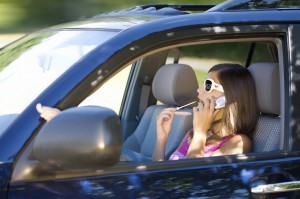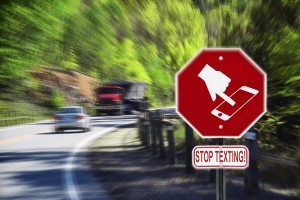After analyzing nearly 1700 videos showing teen drivers in the moments just before they got into a car crash, researchers at the AAA Foundation for Traffic Safety discovered that roughly 6 out of every 10 moderate to severe wrecks studied involved some sort of distraction as a contributing factor.
These results are much more alarming than the still-frightening statistics currently promoted by the National Highway Transportation Safety Administration (NHTSA) in which only 14% of all wrecks involving a teenage driver were the result of some distraction.
Just what exactly were those drivers doing immediately prior to their respective car crashes?
Well, for example, 12% of the distracted teen drivers studied were using their cell phones in some way–texting, making calls, etc.
And another 29% were either “interacting with passengers,” “singing,” or “grooming” in the run up to their wrecks.
While we no doubt have a serious problem with people of all ages refusing to drive responsibly, teen drivers–statistically 4 times more likely to get into a car wreck than adults–are often singled out for criticism.
And for good reason.
Car crashes are the leading cause of death for people aged between 16 and 20–killing, on average, over 5,600 teens annually.
While I have yet to see a silver bullet solution that will solve the serious problem of distracted teen drivers, I have seen some solutions that could potentially cause some serious problems of their own.
Do we really need our teenaged drivers to be banned from driving in highly-populated areas?
Will that really teach them anything about taking responsibility for their actions by conducting themselves properly when out in the world dealing with real-life situations?
What about taking away their ability to make (and learn from) mistakes by forcing them to ride in automated or “driverless” vehicles?
Is this the beginning of the end for people-driven cars in general?
But can we really trust companies like GM, Ford, Nissan and to make driverless cars that are safe?
What about the auto industry’s safety track record recently?
Recalls were through the roof in 2014 and are on pace to continue to rise into 2015 and beyond.
While everyone can agree that steps should be taken to minimize the number of accidents caused by distracted drivers–both teens and everyone else–let’s not be too hasty to hand over complete control to corporations that have already demonstrated that they can’t always be trusted.

